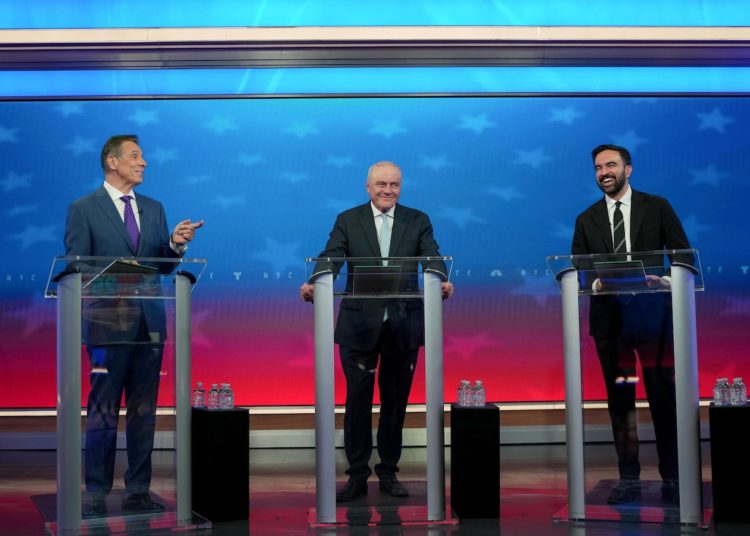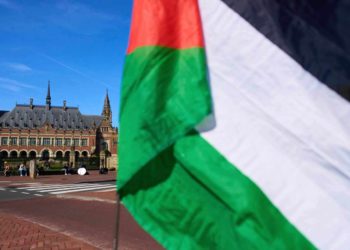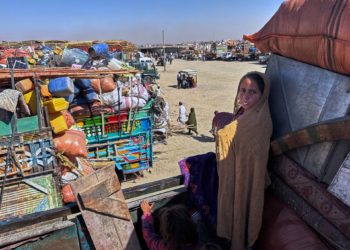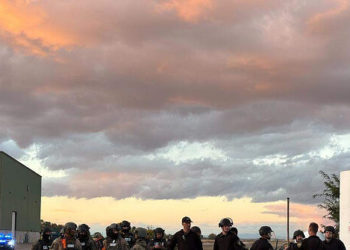U.S. President Donald Trump, in a reprise of two previous summits and one meeting, has said he will reach out to North Korean leader Kim Jong Un. This sentiment was taken a step further in conciliatory gestures to Pyongyang by newly elected South Korean President Lee Jae-myung, sparking a wave of hopeful policy proposals from Asia watchers for U.S.-North Korea and inter-Korean peace deals. Yet after 30 years of failed diplomacy, is this simply a triumph of hope over experience?
There have been some tentative hints from the North Korean side. In a public statement in July, Kim’s sister, Kim Yo Jong, implied dialogue with Trump may be possible, but only if the U.S. drops its demand for North Korea’s denuclearization. She stressed the permanence of Pyongyang’s nuclear status, noting that its “capabilities and geopolitical environment have radically changed.” This statement came just one day after Pyongyang slammed the door firmly shut for South Korea’s outreach.
The Korean Peninsula has become a far more dangerous place since the failure of the 2019 Trump-Kim summit in Hanoi. Reeling from the collapse of talks and taking stock of what it perceived as a decline in U.S. global power, North Korea fundamentally recalibrated its foreign policy.
Pyongyang’s shifts have included downgrading its three-decade interest in normalizing ties with the United States and aligning with Beijing and Moscow, now ensconced in what some have called the “axis of upheaval.” Its ties with Beijing have frayed as its relations with Russia have reached new heights, exemplified by the new North Korea-Russia Treaty on Comprehensive Strategic Partnership and Kim Jong Un’s supplies of ammunition, troops, and laborers to Russia. Meanwhile, North Korea’s missile and nuclear programs have seen substantial advances.
Kim, emboldened by these new realities and comfortable with his new economic support and military technology from Moscow, proceeded to adopt a new doctrine allowing preemptive nuclear strikes as well as codified the country’s nuclear status into the constitution. Dramatically, Kim publicly trashed his father and grandfather’s 50-year-old stated goal of reunification; Pyongyang then followed up by defining South Korea as a “hostile state” in its constitution. These changes have transformed the geostrategic landscape of Northeast Asia. There is an understandable sense of urgency for policy responses.
But this new predicament undermines the logic and most of the assumptions on which diplomacy with North Korea have been based. Why? Because it radically alters the cost-benefit calculus to both sides.
What concessions might Kim be willing to make that would be worth the price the United States would have to pay and vice versa? North Korea has always held up the fate of Iraq and Libya as examples of why the U.S. cannot be trusted. The recent U.S. Iran bombing almost certainly reinforced Kim’s conviction that he would never give up his nukes for U.S. guarantees.
Kim is not interested in Trump towers or McDonald’s in Pyongyang. It’s not that North Korea would mind normalizing relations with the U.S. (if it gets to keep its nukes), or having U.N. sanctions lifted, or to have its nuclear-state status legitimized like Pakistan or Israel—or possibly even seeing the more symbolic measures taken, such as an end-of-war declaration or a peace treaty.
The problem is that for Kim, these are in the nice-to-have category, nothing worth paying a real price for. In addition to the benefits of Moscow’s support, some $6 billion in hacked cryptocurrency and lax U.N. sanctions enforcement have made Kim cocky and less concerned about lifting U.N. sanctions. All told, this situation provides Kim with even less reason to make any substantive concessions on nuclear weapons to the US that would merit a credible deal. On a recent visit to a new North Korean beach resort, Russia’s foreign minister even offered a vote of nuclear legitimacy, saying, “We respect North Korea’s aspirations and understand the reasons why it is pursuing a nuclear development.”
Yet governments and think tanks alike still seem slow to fathom the depth of change. For example, a recent meeting of the Quad (U.S., Japan, India, and Australia) reiterated the long-standing U.S. goal of “complete denuclearization of the Korean Peninsula.”
Some worry that in his quest for a Nobel Prize, Trump might sign a flawed deal with Kim. Proposals range from ambitious game-changers to modest or symbolic measures in what is infinitely a more difficult diplomatic environment. From his new position of strength, Kim might be willing to engage in exploratory dialogue—but finding an offer that would be acceptable to Washington or Seoul is another matter entirely. Many analysts recognize that the situation on the ground has changed but underestimate what this means for diplomacy.
In one of a series of recent essays in Foreign Affairs, a longtime Korea hand, acknowledging that denuclearization is now off the table, suggests reviving the deal that Trump rejected in 2019 as the “least bad” option, an idea also floated by a D.C. think tank. That deal was to dismantle its known nuclear complex at Yongbyon in exchange for U.N. sanctions relief.
This argument’s logic is flawed at both ends. For the U.S., freezing the nuclear status quo and Pyongyang agreeing to halt intercontinental ballistic missile (ICBM) and nuclear tests and fissile material production is implausible, and would come with questionable costs and at best modest benefits. Kim has refused to declare an inventory of his nuclear program, and previous deals have collapsed over a lack of transparency. A credible freeze would cap the nuclear status quo but leave in place an undiminished military threat.
Another Foreign Affairs essay penned by leading Korea scholar and former policymaker Victor Cha is careful to acknowledge the new strategic context, Pyongyang’s leverage, and denuclearization being off the table, and sees an urgent need to “arrest these developments.” Fearing impulsive Trump deals, he sketches such a scenario, proposing a ban on all North Korean nuclear and ICBM development, weapons tests, and fissile material production. But he goes much further, arguing for linking a deal to peace in Ukraine—“stopping the supply of North Korean troops and ammunition to Russia.”
Cha rightly describes the likely price for such concessions as “unprecedented and worrisome”: abandoning denuclearization and agreeing to arms control; withdrawing U.S. forces from South Korea; and supporting South Korea’s nuclear latency. He makes a persuasive case that Trump, based on previously stated views, might be amenable to such steps—even at the expense of U.S. Asian alliances. Also, he points out that such moves would track with the administration’s strategy of focusing on the threat from China – and pressing allies to prioritize it above other regional threats.
This scenario may be more warning than advocacy and would certainly upend the East Asian security architecture and the U.S. role—but not North Korea’s nuclear and missile status quo. Moreover, it is a very long shot to bet he would rip up his deepening Russia partnership, which Kim is publicly invested in and has institutionalized at every level across all sectors.
Other propositions, some in these pages, include linking partial U.S. troop withdrawals from South Korea to a phased withdrawal of North Korean troops from Ukraine and Moscow’s restraint on the Korean Peninsula.
This misreads the situation in several ways. First, the United States is already considering withdrawal and repositioning some 4,500 troops from South Korea to elsewhere in the Pacific unilaterally. So why would Kim risk his alignment with Russian President Vladimir Putin? Moreover, the cooperation of Russia and China that yielded agreement in the 2005 Six-Party talks on denuclearizing North Korea has been eclipsed by zero-sum great-power competition.
Another recent Foreign Affairs article keyed in on inter-Korean relations, noting, “With U.S. President Donald Trump back in office, Lee will have a rare window of opportunity to make progress with North Korea.” The optimism of this proposal is understandable, as the current U.S. and South Korean leaderships are either repeats or echoes of 2018 and 2019. Trump is in the White House, and a progressive president is in power in South Korea.
That is pretty much where the contextual similarity ends, however. Kim’s stunning reversal of a 50-year reunification policy, announced in December 2023, marks a fundamental change in inter-Korean dynamics, and it is here to stay. This policy was foreshadowed by Kim’s emphasis in 2021 on the development of tactical nuclear weapons, whose primary target is South Korea, and the revision of the nuclear law, which implicitly expanded the scope of nuclear strike targets to South Korea. These were just two of multiple indicators that Kim envisions a very different inter-Korean relationship than in the past.
In October 2024, North Korea defined South Korea as a “hostile state” in its constitution. As noted above, Kim Yo Jong, who has a role issuing authoritative statements on North Korean policy, recently reaffirmed that it had no interest in talking to Seoul which, she emphasized, “can never be the partner of reconciliation and cooperation.” Despite Lee’s unilateral steps to reduce tensions, the door seems firmly shut.
These new challenges to stability come amid some turmoil and ongoing tensions we anticipate in the U.S.-South Korea relationship. Trump’s pressure on Seoul—tariffs, increased defense spending, and an expansive South Korean regional military role—will likely yield a near-term deal, and with it, likely resentment and distrust among many in South Korea.
But mounting U.S. pressure on South Korea to commit its military to a Taiwan contingency is likely to raise strains in the alliance and risks weakening deterrence against North Korea at a time when unprecedented threats are amplifying by the day.
In this context, our skepticism about diplomatic initiatives and possible peaceable outcomes is not aimed at dismissing innovative diplomatic approaches, including those presented in the articles we critique. Rather, it is aimed at highlighting the need for realistic expectations in light of the enormity of transformation on the Korean Peninsula—Pyongyang’s reorientation and new sense of importance on the Korean Peninsula meshed with heightening great-power competition.
Sustainable security in the region will ultimately depend on strengthened deterrence. But seeking to open diplomatic channels, unconditional offers for talks to explore risk reduction measures to mitigate the dangers of misunderstanding or miscalculation are a key part of the equation. There are some wicked problems that defy full answers and can only be managed, not solved.
The post Trump Won’t Find a Nobel Peace Prize in Pyongyang appeared first on Foreign Policy.




